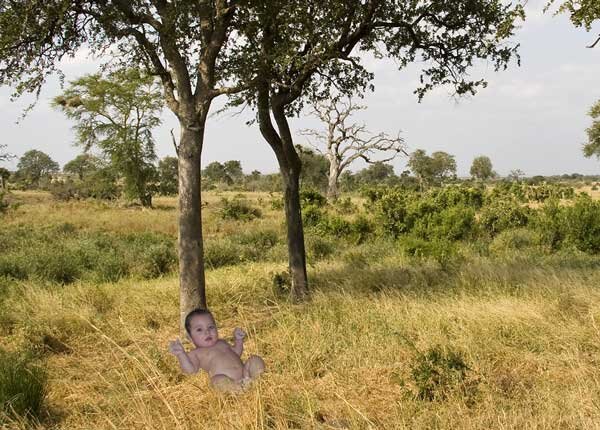See me, feel me, touch me, heal me
The way towards each other is through our bodies. Words are the longest distance you can travel so complex and hazardous you lose your direction.
Jeni Couzyn
Please allow me to introduce myself.
I was born about 2 minutes ago into the wild, mosaic grassland of East Africa. I am, of course, entirely naked. My skin is soft, my senses are untrained and my limbs are nearly useless. I am, to put it in the most elemental terms, some 7 or 8 pounds of high-quality protein, protein that is craved by a wide range of predators and carnivores that prowl nearby. Unless someone intervenes immediately on my behalf, I will almost certainly be consumed before nightfall, by large animals, reptiles or bloodthirsty insects. And, even in the unlikely event that I manage to escape predation, I am still vulnerable to the elements: searing heat, freezing cold, intense sunlight, wildfires and thunderstorms. To put it in a single word, I am exposed.
I am well aware of this fact. I have no words to describe my experience, but my body knows full well what’s going on. It can sense the nakedness of my skin and the urgency of my predicament. I need protection immediately, preferably from a warm, strong and intelligent body that will care for me and protect me from danger. In other words, I need to attach to someone. Now.
If Mom or some other big human can care for me in this moment, my entire body, mind and spirit will relax. I will experience the world as safe, even friendly. My metabolism will surge with growth hormones and my mind will turn towards curiosity and exploration. Oxytocin will flow through my bloodstream and I’ll be on a path to a strong and successful life as an adult human animal.
But if Mom is absent or unreliable, my mind-body will come to an entirely different conclusion. I will experience the world as threatening, unpredictable and dangerous. Stress hormones will surge, setting in motion a cascade of protective psycho-physical responses. I’ll burn my energy reserves for immediate action instead of investing them in growth, development and learning. In short, my body will prepare itself for battle in the here-and-now and let the future–if I have one–fall where it may.
This story may be a cartoon of sorts, but this experience is in fact a human universal. We have all felt this sense of exposure at some point and our bodies, minds and spirits retain this sensitivity throughout life. Our subconscious brains are always on alert, asking that most primal of all questions, “Is this world friendly?”
This is why modern discoveries in parent-child attachment are so vital. We now know that the quality of a child’s attachment has profound consequences, not just for childhood, but for our entire life trajectory. Research by Mary Ainsworth, John Bowlby and others proves it: individuals with secure attachment relationships in infancy go on to have superior health, better relationships and more successful careers. Secure attachment is a better predictor of success in life than common measures such as IQ and SAT scores.
Attachment sets the tone for our social experience throughout life. The child’s first human relationship generates powerful expectations and becomes a model for every other relationship that he or she will encounter. If attachment is weak and insecure, the child will unconsciously conclude that people are not to be trusted and that vigilance is essential. But if attachment is loving and secure, the child will assume that social relationships are sources of pleasure and interest. The ripple effects are enormous; attachment has consequences that extend all the way out into future generations.
Attachment is clearly essential for health, but how does the child know that she is being cared for? Words, after all, are useless. Instead, the infant senses safety through the skin, through touch, warmth and rhythmic rocking. But even more to the point, she is reassured when her emotional state is received by another person, when her needs are understood and absorbed by someone who can do something about them. In other words, the infant needs to “feel felt.” It is only when her emotions connect with a human target–one who responds, interacts and is changed–that she can finally relax. Someone understands. Someone cares.
Of course, none of us get to choose the circumstances of our birth or infancy. If we’re lucky, we have loving caregivers from the outset. If not, we suffer. But no matter the quality of our original relationships, our quest for secure attachment never really ends. In a real sense, we remain naked and exposed throughout life; even as adults, we continue to feel a lingering, unconscious sense of vulnerability. Clothing, community and money can help protect us against the overt dangers of the world, but our bodies remain vigilant and we continue to need reassurance. We need other people to wrap their arms around us, hear our stories and protect us from the elements. Even adults need to “feel felt.”
This is why attachment and the so-called “soft” interpersonal arts must be integrated into our health, fitness and medical disciplines. Hard science is not enough. Diet and exercise is not enough. Biochemistry and biomechanics are not enough. We may well give our clients and patients the ideal combination of sets, reps and substances, but unless they “feel felt,” much of our effort will be for naught. Indeed, almost everyone has a story of leaving a health care office with a prescription or program in hand, but with a lingering sense of emptiness and a feeling that one has not been heard, much less felt.
Expert knowledge has its place in our professions, but the task before us is to practice something much older and much more primal. We need to be touching and hearing people’s lives, not just their numbers. Every encounter, personal or professional, offers an opportunity to increase attachment or at least help others feel slightly less naked. Everyone we meet desires protection from the dangers of the world. Connection is not simply a nice thing to have; it is powerful medicine in its own right.
So put down that electronic device and look at that person in front of you. Give up your frantic, workaholic striving for a moment and hear their story. If you can help them “feel felt,” even for a moment, you can change their body, their spirit and the trajectory of their entre life. And we will all be the better for it.
Thanks to Dr. Dan Siegel for inspirations


